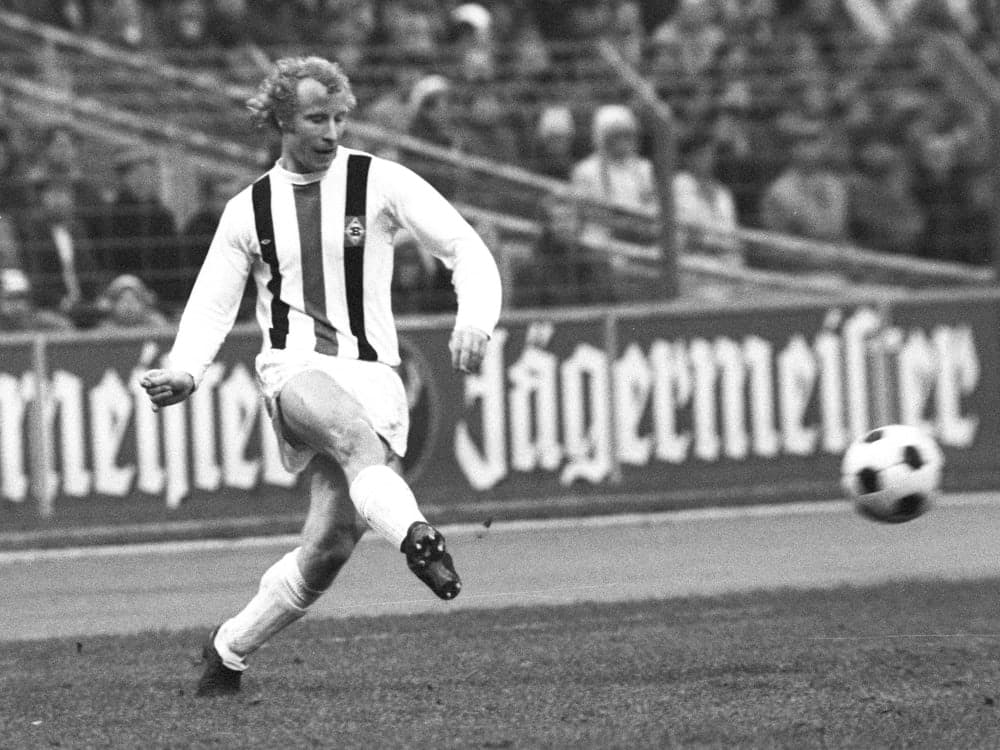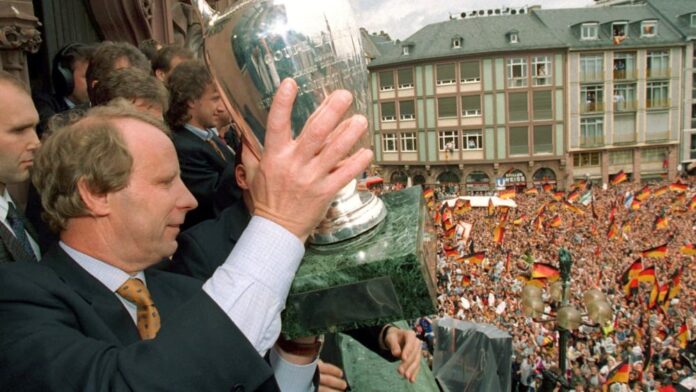Few players can match his success. As national coach he won the European Cup in 1996. Terrier and title collector. Berti Vogts turns 75.
Naturally, there were plenty of anecdotes going around in September at the meeting of the 1996 European champions. Many of the stories at Europapark Rust sounded quite different from what had happened 25 years ago in England. What is known, however, is the surprising trick Berti Vogts used to exert a decisive influence in the final.
“At the end,” Jürgen Klinsmann recounts, “the boss had the brilliant idea of substituting Oliver Bierhoff – which we all didn’t understand.” Vogts’ assistant Rainer Bonhof, for example, was wide-eyed when the national coach gave the somewhat angular striker the signal to come on in the 69th minute of the Wembley final against the Czechs. A successful move, unexpected, but a complete success: four minutes later Bierhoff scored to make it 1-1, and in extra time he scored a golden goal to send Germany to the European Championship title.
And Berti Vogts? He celebrated the greatest triumph of his coaching career afterwards, dressed in a black suit, light-coloured shirt and orange tie, with a la ola in front of the German fans. “These moments,” he once wrote, “will always remain unforgotten for me and will always have an outstanding significance. “
The grand entrance was never his world
The star is the team – this premise applied to Vogts not only in these weeks in England. For him, it was an expression of his pronounced team spirit, but always combined with the feeling of being overlooked himself from time to time. A bit of a defensive attitude always clung to the trained toolmaker, who was called the “Terrier” because of his venomous defensive work as a tough defender.
In London 1996, Vogts was in the limelight, but the grand entrance was never his world. The man from Büttgen near Neuss often seemed wooden and awkward. And always a little sceptical in public, especially when dealing with the media. Especially since he succeeded the shining light Franz Beckenbauer as coach in 1990, who as a man of the world was the opposite of the often staid Hans-Hubert Vogts. “If I could walk on water, my critics would still say: He can’t even swim,” Vogts once complained about the often unjustified or exaggerated criticism.
Viewed from above and smiled at
Vogts, who often appeared to be a bit of a bore, slammed many doors on himself, often becoming the target of ridicule and malice. A certain bitterness also spoke from his words when he resigned as national coach just two years after the great success in London. Shot at from many sides, heavily criticised, he vacated his seat. “I owe it to myself to defend the last vestige of human dignity that was left to me,” Vogts said at the time.
He could have been much more relaxed about his successes as a coach and, of course, as a player. Many would have to bow deeply before his life’s work and his sporting successes, but his path is also marked by the fact that the 1.68 metre tall Vogts was often looked down upon and ridiculed.
For example, in Stefan Raab’s “Bööörti” mockumentary in 1994; also legendary is the peculiar short appearance in a 1999 crime scene with the remarkable Vogts phrase: “Give the rabbit an extra carrot, it saved our lives. “
Great successes as a player

Few players come close to Vogts’ successes, who played a major role in shaping the great era of the Gladbach Foals in the 1970s. In 1965, following Borussia Mönchengladbach’s promotion to the Bundesliga, he came to the Bökelberg from VfR Büttgen for 28,000 marks. He played a total of 419 Bundesliga games for Borussia, became German champion five times, cup winner once, world and European champion and ended his career in 1979 as a two-time UEFA Cup winner.
Vogts’ statement after winning the UEFA Cup for the second time in 1979 is also fondly remembered. At that time, he sat in the dressing room with the cup and predicted to his team-mates with shining eyes: “Take a good look at the cup. It will be the last one Borussia wins for a long time.” He was right about that.
In the late autumn of his career in 1979, he suffered a broken leg and ankle in a cup match against Wuppertaler SV and had to take months off. Borussia went into a tailspin, but – typical of Vogts – the combative defender came back and helped prevent relegation.
It was above all the often bearish coach Hennes Weisweiler who shaped the unyielding defender Vogts, who had become an orphan at the age of 13. Weisweiler became a kind of father figure for the extremely ambitious defender, who later also had to intervene frequently when the coach had a falling out with playmaker Günter Netzer.
Vogts was always there, a valuable team player, indestructible, always at full speed. The spotlight, however, was usually on others, Netzer in Gladbach, Franz Beckenbauer in the national team, for example, even if Vogts had the magnificent Dutch captain Johan Cruyff fully under control in the 1974 World Cup final.
Training coach and world traveller in football
After his active time, Vogts started at the DFB as a youth coach in 1979 and remained with the association for eleven years. He initiated projects with concepts and ideas for youth work, even though many suggestions were only implemented after his time. When I suggested that 16 youth training centres should be set up in Germany, the association said: “We don’t have the money. Today there are over 300 bases,” Vogts once complained.
He then had little success as a club coach at Bayer Leverkusen, where he remained in office for just under a year. After that, he became a world traveller in football, travelling as a national coach in Kuwait, Scotland, Nigeria and Azerbaijan. His love of golf also stems from his time in Scotland. “Anyone who was a coach in Scotland and can’t play golf,” Vogts once said, “there must be something wrong.”
Before the 2014 World Cup, his former player Jürgen Klinsmann brought him to the US national team as an advisor. After Klinsmann’s suspension, Vogts recounted, he immediately approached those in charge and said: “My job is finished. If they have sacked Jürgen, I can’t continue to work there. “
For a long time, he was a regular at his Borussia’s home matches, watching many games together with his son Justin. And today? What is he planning? How will Berti Vogts celebrate his 75th birthday on Thursday, 30 December? In the past, Vogts often celebrated the turn of the year and his birthday at the Black Forest Hotel Traube Tonbach. Perhaps he will do the same this time as he did five years ago on his 70th birthday: he announced that he would celebrate alone, with a good glass of red wine. Perhaps in thoughts of his great successes. For example, of a quite spectacular evening in 1996 at Wembley.







